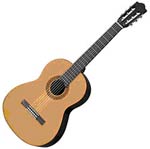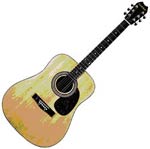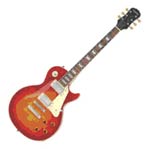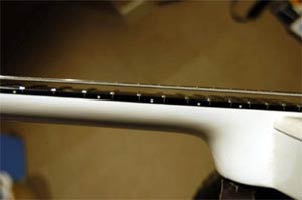What kind of guitar should I learn on?
There are three main types of guitar that you will encounter.



Chances are that if you have asked someone if you can use their guitar for a while, it would probably be an old classical acoustic guitar or maybe a steel string acoustic.
These guitars are excellent to learn on because electric guitars require things like leads, amps, speakers and power. With acoustic guitars you only need a pick.
The other great thing about acoustic guitars is that you can't turn them up loud. When you are learning it is probably better to play on a guitar that isn't going too be loud, only loud enough so your ears can hear your errors and your good performances.
If you don't know which types of guitar you want to play on, ask yourself, 'what kind of music do I want to play?'
Pick a song that you like for its guitar sound. Listen to the guitar sounds and only the guitar sounds. Are they clean, soft sounds? Or are they harsh, heavy or distorted? Generally, acoustic guitars are softer and cleaner. Distorted, heavy sounds come from electric guitars that are plugged into amplifiers and effects units. Can you hear individual notes being picked or are the strings being strummed hard? The harder you play, the thicker your strings need to be. You need to know what style you want to play.
OK you have found a style of music that you like. Try and find out what the band video for that song is and watch it. There will probably be a section in there where the band is playing. In this part, look at the guitarist. Is he/she playing on an electric guitar or an acoustic guitar? What brand is it? What style? If you know the exact guitar from the video, you can ask to play on it at your local guitar shop to see if it suits you.
People play guitar for many different reasons. You need to understand what it is that you want to get out of the guitar. To discover your tastes in guitar music, listening to different styles and genres. Ask musicians at music shops about what kind of guitars different bands use, or ask them what kind of amps/effects those artists use to get that sound.
The answers don't have to be exact because they will get you thinking about what you need to buy to achieve the sound you are after.
For more information on achieving different guitar sounds, see our articles on guitar effects and guitar manufacturers and guitar models.
When it comes to choosing the right guitar for you, the most important point to keep in mind is - what sort of music are you looking at playing?
If you are looking at playing Rock Music, the best guitar is to go for an Electric Guitar. The key here is to start small, and grow big. I have seen so many people go out and buy the most expensive guitar before they can even play anything. You may have your heart set on a new Fender or Gibson Les Paul. These are just some of the big brands and are not really recommended for beginners.
Second hand guitars are another option to go for. There are some great deals going in the local papers. When looking for a guitar, make sure you plug it in and try it out. Grab the strap if need be and put the guitar around your neck.
Get every possible bit of information you can before making a decision.
The best guitar to go for if you are looking at playing Classical Acoustic music is either Spanish classic acoustic guitar, or steel string acoustic. Spanish classic acoustic guitars are extremely light and having nylon strings, which are very soft on your fingers. They come in a range of different sizes even very small size for young kids. Spanish Classic Acoustic guitars are also a lot cheaper and easier to maintain than Steel String Acoustic Guitar.
Steel String Acoustic Guitars are a little more expensive compared to Spanish guitars.Again, with acoustic guitars,there is no need to go for big brands when you are first starting out. The most important thing is that you feel comfortable playing it. Also, make sure your fingers fit around the guitar neck and it is not too big for you to play.
There are many possibilities when comes to choosing a guitar for yourself, but more importantly, it's how you play it, which determines the sound.
A guitarist with a good grasp of leads and strumming techniques is the key influence to a group's overall sound.
Article by Chirs Elmore
Open the case on a brand new shiny quality guitar and it's like opening the door to a new sports car or sedan. Pick up a fine collector guitar and you can just feel the crafsmanship and the skill that shaped instrument. But which should you buy?
For collectors or speculators, the the answer may well be the same ... either one ... new or used. Collectors are mainly interested in the beauty, crafsmanship, historical value, or ownership history of a guitar, not the playability. As a collector, you should pick the guitar you like, buy it, and enjoy it. Speculators are mostly concerned with increase in monetary value. And if you're a speculator, then pick the guitar you think will appreciate the most, hold onto it for whatever period you like, and then sell it. If you make money you chose right. If not, you made a bad investment. My advice to you, buy low and sell high!
So this discussion is primarily for players, although there are a few points of interest to collectors and speculators.
If you're buying it to play, then, which should it be?
In general, new guitars from quality, reputable manufactures are going to have the edge in playability. Machine tolerences and woodworking equipment tolerences are better than ever. Computer-controlled lathes and other computer-controlled manufacturing and quality control instruments and procedures ensure that new guitars are more consistent and standard than ever before ... although it may cost you more money up front than a used guitar.
But before you give up on used guitars, let me raise another issue. Are you looking for an acoustic or electric guitar? Many people feel that as acoustic instruments get older, they sound better. As the wood ages it can dry out or undergo other subtle, but noticable changes, which can enhance its sound. For the entire guitar its characteristics such as moisture content, hardness of the varnish, adhesiveness of the glue, strength of the joints, and other vitals can change as it grows older. Stradivarius and other violin makers of the late 17th and 18th centuries created instruments that are prized today, not just as collectors' items, but sought by virtuoso performers for their beautiful tones.
For the most part an electric guitar gets most of its sound quality from its electrical components: the pickups most notably. This is especially true of solid body guitars. Aging contributes little to improved sound from electrical or electronic devices. Pickups, volume, and tone controls get noisy. The wear and tear of frequent use damages the contacts and other small parts. And although they can be cleaned or replaced, sometimes it is more expensive than new equipment.
What kind of warranty or guarantee is available. Frequently there are no warranties or guarantees with used equipment. And sometimes getting the service is difficult even if there is a guarantee.
Is it stolen? Guitars are easily transportable and easy to sell, so it seems that musicians and guitarists in particular are frequently targets of thieves. Before you buy a used guitar I would recommend that get the serial number and then search the web for "stolen guitar" or "stolen guitar registry". Double-check the instrument and report it if it is stolen. You will be doing the right thing!
Is it genuine? Are you able or qualified to identify a counterfeit from the real thing?
What about the residual value? If you like to trade guitars frequently, you should be aware that a quality guitar whether new or used maintains a reasonable residual value. However, not every used guitar becomes a collector's item. And many people are leary of used instruments for the reaons mentioned previously.
What about buying over the Internet using the world wide web? If you are buying a guitar, make sure you are dealing with the website of a reputable dealer. This will protect you from some of the issues mentioned above such as stolen or counterfeit items. Check through old issues of guitar and music magazines at the library. If a music store has been in business a long time you can probably order from their website safely. But make sure they sport what I call the web safety logos. Logos from Verisign, the Better Business Bureau, and other authorities are the first step. But logos are easy to copy, so check them out! If you have trusted friends who have ordered from them, ask for their feedback. Check out their return policies and make sure they have insured shipping available. If you're dealing with an individual, I would suggest using one of the web escrow services to ensure that you receive your guitar before payment is released.
The bottom line?
Well for me it's playability. And in general, for the best playability, warranty, or guarantee,
it's hard to go wrong with a new guitar from a reputable music store or website.
Mike Furlong
I like to play guitar, talk about guitars, and collect them. So many guitars, so little money!
Check out
Electric Guitar Advisor
or my blog Electric Guitar Advisor Blog
Often cheaper than a new guitar and just as ready to rock out, a used guitar could be the perfect addition to your collection or the perfect thing to start you off, but how do you know that your potential purchase is not a potential dud?
The truth is that some fantastic guitars, while expensive when new, are relatively cheap secondhand. Sometimes you can find a custom or a limited edition guitar that someone is selling quickly for the cash and you can often get a real bargain if you know what you are looking for. It really pays to do the research before thinking about buying a second hand guitar, as some sellers will push their price up to cash in, especially if they know they are selling to a beginner who may not know much about guitars.
So, as a beginner who may not know much about guitars, what should you look for when inspecting a secondhand guitar?
Let us just say that you have found a secondhand guitar in the musical instrument section of the weekly classifieds and you are quite keen to go and look at it. Below is a list of hints that will help you when inspecting the guitar and talking to the seller:
It is best if you do some research on the make and model of the guitar. Next start asking price elsewhere, both new and used, and whether or not other people are experiencing problems with it.
About the condition of the guitar – If they are honest, the seller may tell you about any damage that is undetectable upon rough inspection.
How long they have had the guitar – If they have had it for a long time, they should have a good knowledge of its history of use, repairs etc. If they are not forthcoming with that sort of information, they may be trying to pull one over you.
The overall condition – Look the guitar over and make note of any obvious damage – guitars often take a bit of wear and tear and if its just small scrapes and scratches then the guitar will probably be fine. Look for rust also, not on the strings, but on the hardware that is holding the strings and the pickups. If there is any rust in these places, run, it is not worth it! What good is a guitar that may fall apart on you in the near future? Trust me – leave it alone.
The neck of the guitar – the neck is important. Here are some areas to look at:
Make sure that the neck is not warped or out of shape in any way.
Check the area where the neck joins to the body of the guitar – look for cracks where it may have been broken in the past.
In the same fashion, check the area where the neck joins the head of the guitar.

Check the action – Action is a word that describes how close the strings are to the fret board starting at the head of the guitar all the way down to the bridge. It is preferable to have the strings very close to the fret board as to make it easier to press them down (not so close that they are touching of course). If the strings are nice and close to the fret board all the way along, you would say that the guitar has a good action. Pictured right is a guitar with poor action. Notice that the strings sit quite far off the fret board. Guitars with poor action are harder to play and do not sound very good. You can fix the action on your guitar by taking it to a guitar technician, but it will cost you between $20 and $50.
Check the intonation of the strings. Intonation is a word that describes the accuracy of each individual note that the guitar can produce on any string. If the intonation is correct, every note on the guitar will be the correct pitch – If it is out, the guitar will be impossible to tune and it will sound horrible. To roughly check the intonation, play the E shape barre chord on each fret of the guitar. As you move towards the bridge of the guitar, you should hear the chord keeping its pitch – if not, the intonation is out, and you will need to get a guitar technician to work on the problem.
If the guitar you are looking at is an electric, you must plug it in and see how it sounds through an amp. Ask the seller if you can play it through your amp and if you do not have one, ask someone if you can borrow his or hers. Try the following when testing an electric guitar through an amp:
Turn the amp up to a fair volume level and then play with the volume and tone controls by turning them to full and then back to zero. Test the pickup selector by flicking its switch back and forth. Carefully listen to any sounds while doing these things. You are looking for scratchy sounds or clicks that might indicate old or worn electrics.
Strum a single chord and while the chord is ringing start playing with the controls like before, still listening for scratches, clicks, or any other nasty sounds. Guitar technicians can fix these problems and most guitars need to service every 5 - 10 years. Just be aware of this fact or you could find yourself spending more money than you first intended.
Check, the sound of the guitar – Before you buy, you want to know that the guitar sounds like it should. Once you have tested the guitar sound, go to a music store, and ask to play on a new model of that guitar. If possible, use a similar amplifier to the one that you tested the second hand guitar on, and see if you notice any BIG differences. There is a simple rule that I like to follow: If you are not happy with the guitar sound… Do not buy it!
A guitar is a major purchase and you want to get the right one. Leave yourself time to go away and think about the purchase. If you have doubts when checking out a guitar, you are probably better to leave it and hold out for something that better suits you.
If you are new to the guitar and a little worried about testing guitar in public – do not worry. It is important to remember that you are not there to highlight your playing ability – you are there to discern whether your proposed buy is a good deal or not so just go for it.
If you are still worried, take an experienced guitarist along with you when you are looking at a possible purchase. See if you can persuade a teacher or a friend – most musicians love to help newbies. Not only will they be able to offer helpful advice – they will be good moral support when it is time to pick up the guitar and test it out in public.
Article provided by: